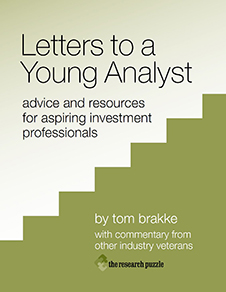
- Saturday, June 2nd, 2012
- network dynamics
-
We still use the phone to conduct business and there’s nothing like communicating face to face, but many of our conversations (business and personal) now occur in an electronic ecosystem, often in ways that we don’t really think about very much. We are busy weaving social webs with others — and how we do so ultimately matters a great deal.
One of the best breakout sessions at the CFA annual conference featured Brian Uzzi, a professor from Northwestern. It was in a slot at the end of the day and the title indicated it was about using “social networks to build your business.” That’s a well-worn topic that didn’t seem very promising, but I decided to hang out in the back of the room to see if there was anything worthwhile. There was.
Uzzi talked about network dynamics, opening with the differences between the networks of Paul Revere and William Dawes, the theory of six degrees of separation, the nature of high school dating networks (and corporate boards of directorsThey Rule | The “about” description says that the site “aims to provide a glimpse of some of the relationships of the US ruling class.” It’s a little clunky, but you can do some interesting network maps.), and the contagion of both diseases and ideas. In today’s world, investment professionals ought to understand how networks function, since the principles feed into the sociology of markets and organizations — and the investment decision process.
Seeing Uzzi’s presentation, I was reminded of a series of postings I did from Defrag 2008, including one called “the social urge.”the research puzzle | It was the second of four postings from the conference. In it, I talked about a presentation by Paul Pedrazzi of Oracle, in which he looked at the different characteristics of people in a network. As I wrote then, “one prerequisite for social networks to be successful in the enterprise is for them to encompass and incorporate the abilities of a wide variety of people, not just those for whom the inclination to use the networks is natural. Otherwise, they are at great risk of become nothing more than echo chambers.”
Yet, as Uzzi noted, echo chambers are in fact what many of our networks become. Whether it’s our personal networks or business ones or (certainly) political groupings, we tend to cluster, creating “a myopic view of the world” with a “common information set.” If you were to design a network for optimal information sharing and decision making, it would look nothing like what most of ours do.
And that’s true for investment organizations. For the most part, information gathering is a free-for-all, which often means that when it comes to decision making, common sources get magnified and unique inputs get marginalized or not used at all. The “tried and true” becomes tired and narrow, without us even realizing it.
What if you could observe and map the flow of information and ideas that you use? Where are the gaps and where are the echo chambers? And where is the “structured myopia”?the research puzzle | This is a piece I wrote in February 2010.
In addition to talking about the nature of networks, Uzzi explained some of his current research regarding “emotional activation and trading.”Kellogg School of Management | Here’s Uzzi’s research page; as of this writing his new research has not been posted. He says that “short-lived psychological states” interpreted from the messages of traders can predict subsequent behavior.
Given the flurry of interest in “the Twitter hedge fund,”VentureBeat | The short-lived Twitter hedge fund, which according to this article “actually worked.” that’s not a new concept, but these types of analyses are in their infancy. The headlines going forward will likely focus on the “beating the market with algos” meme, while I see the power of the research being applied to organizational decision making.
Since it’s the first Saturday in June, tens of thousands of candidates are taking the CFA exam today — and the parade of newly-minted finance graduates continues on stages across the land. I would say to each: Understanding the sociology of the investment business is as important as anything else that you have learned to date (except ethics). You’re probably tired of studying, but if you don’t know much about network dynamics, now is the time to learn.
This is the tenth in a wide-ranging series on the CFA annual conference.the research puzzle | This site is updated with a new PDF each time a posting is added.
